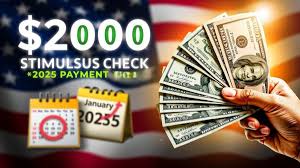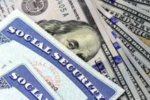The U.S. government is discussing a new $2,000 stimulus check proposal for 2025 to help Americans cope with rising costs and economic challenges. Although not yet confirmed, the proposal has sparked interest nationwide. Here’s a comprehensive guide to what we know so far.
The $2,000 Stimulus Check Proposal
The proposed payment is designed to provide financial relief for millions of Americans struggling with inflation and higher living expenses.
- Amount: $2,000 per individual or household, depending on eligibility.
- Eligibility: Likely based on income, dependents, and filing status, similar to previous stimulus checks.
- Expected Payment Date: Mid-2025, if approved by Congress.
- Official Updates: Track information on the IRS Economic Impact Payments page.
As of now, the government has not finalized or announced this payment. However, staying prepared and informed can help you benefit if it gets approved.
A Quick Look at Past Stimulus Payments
Stimulus payments have historically supported Americans during tough times. Here’s a summary of previous rounds:
- March 2020: $1,200 per individual, $2,400 for couples, and $500 per dependent.
- December 2020: $600 per individual and dependent.
- March 2021: $1,400 per individual, dependent, and household.
These payments targeted individuals and families with lower and middle incomes, offering a safety net amid economic uncertainty. The proposed 2025 stimulus check would likely follow a similar structure.
Who Might Be Eligible for the $2,000 Stimulus Check?
Although official criteria haven’t been released, previous guidelines can give us clues. Eligibility might include:
- Income Thresholds:
- Individuals earning up to $75,000 (Adjusted Gross Income or AGI) could receive the full amount, phasing out at $99,000.
- Married couples earning up to $150,000 (AGI) could qualify, with payments phasing out at $198,000.
- Dependents:
- Earlier payments included amounts like $500 or $1,400 per dependent. The 2025 proposal could offer even higher amounts to assist families.
- Filing Status:
- Single, married, and head-of-household taxpayers would likely qualify, with head-of-household filers often enjoying higher income limits.
- Citizenship and Residency:
- Applicants must be U.S. citizens or resident aliens with valid Social Security Numbers (SSNs).
How to Check Your Eligibility
If the proposal is approved, here’s how you can determine if you qualify:
- Review Your Tax Return: Check your AGI and filing status on your most recent return.
- Count Dependents: Ensure dependents are listed accurately.
- Monitor Official Updates: Visit the IRS Economic Impact Payments page regularly for announcements.
When Could Payments Be Sent?
If Congress greenlights the stimulus package in early 2025, payments might follow this timeline:
- Approval Date: Early 2025.
- Direct Deposits: Arrive within 2–4 weeks after approval.
- Paper Checks: Delivered by mail within 4–8 weeks.
- Prepaid Debit Cards: Distributed to select recipients as an alternative.
Previous stimulus payments showed that direct deposits are the fastest way to receive funds.
How to Get Ready
Even though the payment is not confirmed, being prepared can make the process easier:
- Set Up Direct Deposit: Ensure your bank details are updated with the IRS through a myIRS account.
- File Your Taxes Early: Submitting your 2024 tax return at the start of 2025 ensures the IRS has accurate information.
- Beware of Scams: Avoid emails, texts, or calls requesting personal details. The IRS will never contact you this way.
Frequently Asked Questions
1. Is the $2,000 stimulus check confirmed?
No. Discussions are ongoing, but no official approval has been announced.
2. How do I track my payment if it gets approved?
Use the IRS’s Get My Payment tool to check your status.
3. What if I don’t file taxes?
In earlier rounds, non-filers could register through special IRS tools. This might be an option again.
4. How can I avoid fraud?
Rely only on official IRS updates. Be wary of offers or messages asking for personal or financial details.
Why a $2,000 Stimulus Payment Matters
The rising cost of living, including housing, groceries, and healthcare, has made life more expensive for many Americans. A $2,000 stimulus check could:
- Provide immediate relief for essential expenses.
- Help families manage financial stress.
- Boost consumer spending, aiding the broader economy.








